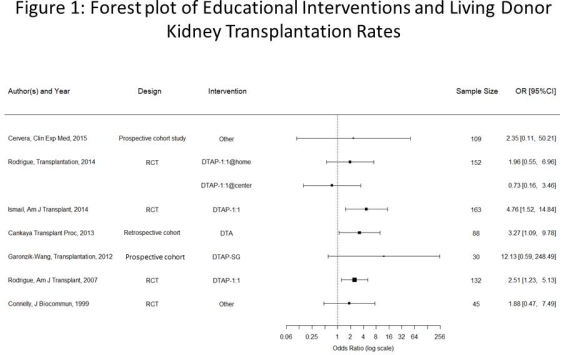Efficacy of Current Educational Interventions in Improving Living Donor Kidney Transplantation Rates
McGill Unversity Health Center, Montreal, Canada.
Meeting: 2018 American Transplant Congress
Abstract number: C127
Keywords: Kidney transplantation, Patient education, Resource utilization
Session Information
Session Name: Poster Session C: Kidney Living Donor Issues
Session Type: Poster Session
Date: Monday, June 4, 2018
Session Time: 6:00pm-7:00pm
 Presentation Time: 6:00pm-7:00pm
Presentation Time: 6:00pm-7:00pm
Location: Hall 4EF
Introduction
Lack of knowledge and discomfort approaching a donor are two of the most common recognized, recipient-level barriers to living donor kidney transplantation (LDKT). To address them, several educational interventions have been conducted. The aim of our study was to analyze the efficacy of these intervention.
Methods
We conducted a systematic review of educational interventions primarily aimed at increasing LDKT or related outcomes. These were sub-classified as decision/teaching aids (DTA), DTA with personal sessions (DTAP), and others. DTAP were sub-divided into small group and 1:1 sessions. Outcomes of interest were number of LDKT, donor evaluations and contacts. In addition, we captured change in knowledge scores, and conducted a descriptive analysis of LDKT related behaviors.
Results
Initial search led to 1813 reports, of which we performed full text analysis on 73 studies: 15 studies were eligible for inclusion, of which 10 were randomized control trials. Interventions included DTA in 1, DTAP in 7 (small group in 4, 1:1 in 3), 4 were classified as other, and 3 studies had multiple arms, involving a combination. Data was heterogeneous and a meta-analysis could not be performed. Only 7 studies reported LDKT rates (figure 1), 5 reported donor evaluations, and 6 reported donor contact. 10 studies assessed change in knowledge scores although no uniform scale was used. Behavior outcomes included willingness, comfort, attitude and readiness. Most of the studies were small and underpowered, with short follow-up, and at high/unclear risk of bias. Studies involving health personnel with 1:1 interactions, previous donors and recipients' social networks, favored LDKT.
Conclusion
Although the premise of most education interventions is the same, to increase knowledge and coaching on how to discuss LDKT, there is a lack of high quality intervention studies, with clearly defined end points. Nonetheless, DTAP related interventions appear to be more effective. Given the cost-effectiveness of LDKT over dialysis the resulting savings could serve to support the cost of personnel required for a personal educational intervention.
CITATION INFORMATION: Sandal S., Dendukuri N., Wang S., Guadagno E., Ekmekjian T., Alam A. Efficacy of Current Educational Interventions in Improving Living Donor Kidney Transplantation Rates Am J Transplant. 2017;17 (suppl 3).
To cite this abstract in AMA style:
Sandal S, Dendukuri N, Wang S, Guadagno E, Ekmekjian T, Alam A. Efficacy of Current Educational Interventions in Improving Living Donor Kidney Transplantation Rates [abstract]. https://atcmeetingabstracts.com/abstract/efficacy-of-current-educational-interventions-in-improving-living-donor-kidney-transplantation-rates/. Accessed February 25, 2026.« Back to 2018 American Transplant Congress

